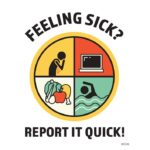Sushi Train restaurant in Nashville is allegedly the site of a food poisoning outbreak, according to news reports. The Metro Public Health Department is investigating. Around 12 customers reported "rapid-onset" food poisoning after eating at the restaurant, which is located at 94 White Bridge Road in Nashville. The patients reported severe food poisoning symptoms. Illness onset dates appear to be late March through late April 2025, according to reports on I Was Poisoned. The Tennessean obtained a report on these illnesses from the health department. The types of symptoms were not mentioned, so it's difficult to speculate about which pathogen may have caused these illnesses. Rapid onset does suggest norovirus, Staphylococcus aureus, or Bacillus cereus. That restaurant has … [Read more...]
Hachi Hachi Hibachi Grill Associated with GI Illnesses in Arkansas
The Hachi Hachi Hibachi Grill is associated with gastrointestinal illnesses in Ed Dorado, Arkansas, according to news reports. Customers reported getting sick quickly after eating at the food truck that was stationed in downtown Ed Dorado. The Japanese grill was shut down by public health officials after "numerous reports" of food poisoning. The owner did not respond to questions from KTVE after these illnesses were reported. The business also has food trucks in Camden and Magnolia, Arkansas. They have been closed as well. There is no mention about the number of people sickened, the illness onset dates, the patient age range or whether or not anyone has been hospitalized. Because people got sick so quickly, the pathogen is likely norovirus. Norovirus is an extremely contagious … [Read more...]
Fresh Catch Yellowfin Tuna Recalled For High Histamine Levels
Fresh Catch Yellowfin Tuna is being recalled for high levels of histamines. Because this recall notice was posted on the FDA's Enforcement Reports page, and not the regular recall page, there is no mention about whether or not any illnesses have been reported to the company to date in connection with the consumption of this fish. The recalling firm is Fresh Catch Inc. of Los Angeles, California. Histamines are a compound that can cause scromboid poisoning. Symptoms of this illness include tingling and burning in the mouth, facial swelling, hives, itchy skin, nausea, vomiting, and diarrhea. Some people can experience symptoms similar to asthma, with wheezing, coughing, or difficulty breathing. The recalled product is Fresh Catch Yellowfin Tuna that is packaged as one loin per … [Read more...]
Wisconsin is Launching a Food Poisoning Reporting Tool
Wisconsin is launching a food poisoning reporting tool called "Feeling Sick? Report It Quick!" to help identify outbreaks and help the health department announce problems to the public to reduce illnesses. The online questionnaire takes less than five minutes to complete. The Wisconsin Department of Health Services State Health Officer Paula Tran said in a statement, "By using this tool, Wisconsinites can help other people in their community from getting sick and prevent outbreaks. Ingesting contaminated food and water may cause just a little stomach upset for some, for others it can lead to hospitalization and be life threatening. We're asking people - when you're feeling sick, report it quick." The new tool asks for current symptoms, places the respondent recently visited, and … [Read more...]
When Should You See a Doctor if You Get Food Poisoning?
When should you see a doctor when you get food poisoning? The Centers for Disease Control and Prevention (CDC) has information you need to know. First, you need to know the symptoms of common foodborne pathogens, such as E. coli, Salmonella, Listeria monocytogenes, norovirus, Staphylococcus, and Campylobacter. Most pathogens cause symptoms such as vomiting, diarrhea that can be bloody, fever, nausea, stomach and abdominal pain, and muscle aches. Listeria is a bit different: the serious symptoms for that infection include a high fever, stiff neck, and severe headache. Some people should always see a doctor if they get sick, even if symptoms aren't very severe. That group includes pregnant women, the elderly, anyone with a chronic illness such as diabetes, and people who have … [Read more...]
Kwik Trip Cantaloupe Recalled For Possibly Deadly Salmonella
Kwik Trip cantaloupe products are being recalled in the wake of a deadly Salmonella outbreak that killed two people in Minnesota and sickened 99 nationwide. The recalling firm is Kwik Trip, Inc. The recalled products are three varieties of fresh cut fruit cup and tray items. They were made with cantaloupe from Trufresh that have been recalled and have been linked to the outbreak. But there have been no reported illnesses associated with these specific Kwik Trip products. The recalled items have sell-by dates of November 4, 2023 through December 3, 2023. They were sold in Kwik Trip, Kwik Star, Stop-N-Go, Tobacco Outlet Plus Grocery, and Tobacco Outlet Plus convenience stores located in these states: Wisconsin, Minnesota, Iowa, Michigan, Illinois, and South Dakota. The recalled … [Read more...]
USDA Study on Consumer Food Preparation Behavior Highlights Risks
A USDA study on consumer food preparation behavior highlights the risks of not following food safety rules. The five year study looked at how consumers prepare meals in light of the risks of food poisoning. The study was produced by the USDA's Food Safety and Inspection Service (FSIS) as part of their efforts to educate the public about safe food handling practices. USDA Under Secretary for Food Safety Dr. Emilio Esteban said in a statement, "These studies are important for USDA to understand consumer behaviors in the kitchen and it is timely to be releasing the latest findings during Food Safety Education Month. The results allow us to shape food safety communications and help consumers safely prepare food." The three areas the study concentrated on were handwashing, thermometer … [Read more...]
Consumer Reports Offers Advice on Safe Seafood Prep and Care
More seafood is consumed in the summer months, especially raw oysters. Learn how to keep seafood safe with these tips. Consumer Reports is offering advice on the safe seafood preparation and care. Like all perishable foods, seafood must be handled carefully to avoid food borne illness. If you choose to eat seafood raw, you must be especially careful. Sushi, ceviche, and raw oyster consumption has been linked to foodborne illness over the years. In fact, earlier this month a man from Missouri died after eating raw oysters contaminated with Vibrio vulnificus. Last year, raw oysters were linked to a sapovirus outbreak. And a Salmonella outbreak linked to raw oysters sickened at least eight people in Florida, Georgia, and Alabama. These foods can be contaminated with pathogenic … [Read more...]
Fireside Grille Caters a Wedding, 51 Guests Get Sick
The Fireside Grille caters a wedding in Altoona, Iowa, and 51 guests got sick the next day, according to news reports. Lindsey Graham-Humphreys, the bride, told the Des Moines Register that her guests got sick after eating food served by that restaurant. The Fireside Grill is located at 523 8th Street SouthEast in Altoona. Some of the guests were sick with symptoms of food poisoning for more than two days. Symptoms were not described, and there is no information about whether or not anyone was hospitalized. The bride contacted the establishment and was not satisfied with the answers. An inspection at that establishment was conducted on June 12, 2023, which was allegedly days before the wedding. And some significant violations were found. This is a screen shot of the inspection … [Read more...]












